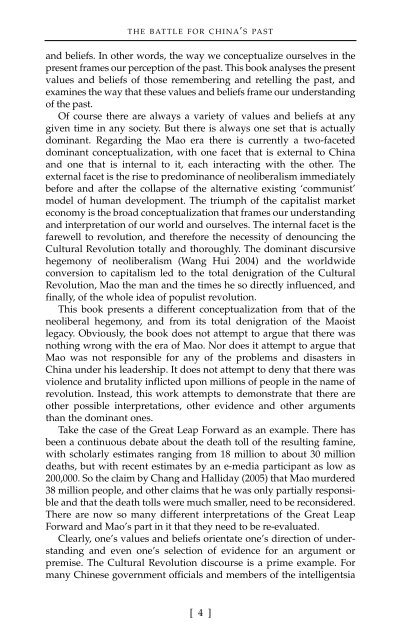Battle for China's Past : Mao and the Cultural Revolution
Battle for China's Past : Mao and the Cultural Revolution
Battle for China's Past : Mao and the Cultural Revolution
Create successful ePaper yourself
Turn your PDF publications into a flip-book with our unique Google optimized e-Paper software.
THE BATTLE FOR CHINA’ S PAST<br />
<strong>and</strong> beliefs. In o<strong>the</strong>r words, <strong>the</strong> way we conceptualize ourselves in <strong>the</strong><br />
present frames our perception of <strong>the</strong> past. This book analyses <strong>the</strong> present<br />
values <strong>and</strong> beliefs of those remembering <strong>and</strong> retelling <strong>the</strong> past, <strong>and</strong><br />
examines <strong>the</strong> way that <strong>the</strong>se values <strong>and</strong> beliefs frame our underst<strong>and</strong>ing<br />
of <strong>the</strong> past.<br />
Of course <strong>the</strong>re are always a variety of values <strong>and</strong> beliefs at any<br />
given time in any society. But <strong>the</strong>re is always one set that is actually<br />
dominant. Regarding <strong>the</strong> <strong>Mao</strong> era <strong>the</strong>re is currently a two-faceted<br />
dominant conceptualization, with one facet that is external to China<br />
<strong>and</strong> one that is internal to it, each interacting with <strong>the</strong> o<strong>the</strong>r. The<br />
external facet is <strong>the</strong> rise to predominance of neoliberalism immediately<br />
be<strong>for</strong>e <strong>and</strong> after <strong>the</strong> collapse of <strong>the</strong> alternative existing ‘communist’<br />
model of human development. The triumph of <strong>the</strong> capitalist market<br />
economy is <strong>the</strong> broad conceptualization that frames our underst<strong>and</strong>ing<br />
<strong>and</strong> interpretation of our world <strong>and</strong> ourselves. The internal facet is <strong>the</strong><br />
farewell to revolution, <strong>and</strong> <strong>the</strong>re<strong>for</strong>e <strong>the</strong> necessity of denouncing <strong>the</strong><br />
<strong>Cultural</strong> <strong>Revolution</strong> totally <strong>and</strong> thoroughly. The dominant discursive<br />
hegemony of neoliberalism (Wang Hui 2004) <strong>and</strong> <strong>the</strong> worldwide<br />
conversion to capitalism led to <strong>the</strong> total denigration of <strong>the</strong> <strong>Cultural</strong><br />
<strong>Revolution</strong>, <strong>Mao</strong> <strong>the</strong> man <strong>and</strong> <strong>the</strong> times he so directly influenced, <strong>and</strong><br />
finally, of <strong>the</strong> whole idea of populist revolution.<br />
This book presents a different conceptualization from that of <strong>the</strong><br />
neoliberal hegemony, <strong>and</strong> from its total denigration of <strong>the</strong> <strong>Mao</strong>ist<br />
legacy. Obviously, <strong>the</strong> book does not attempt to argue that <strong>the</strong>re was<br />
nothing wrong with <strong>the</strong> era of <strong>Mao</strong>. Nor does it attempt to argue that<br />
<strong>Mao</strong> was not responsible <strong>for</strong> any of <strong>the</strong> problems <strong>and</strong> disasters in<br />
China under his leadership. It does not attempt to deny that <strong>the</strong>re was<br />
violence <strong>and</strong> brutality inflicted upon millions of people in <strong>the</strong> name of<br />
revolution. Instead, this work attempts to demonstrate that <strong>the</strong>re are<br />
o<strong>the</strong>r possible interpretations, o<strong>the</strong>r evidence <strong>and</strong> o<strong>the</strong>r arguments<br />
than <strong>the</strong> dominant ones.<br />
Take <strong>the</strong> case of <strong>the</strong> Great Leap Forward as an example. There has<br />
been a continuous debate about <strong>the</strong> death toll of <strong>the</strong> resulting famine,<br />
with scholarly estimates ranging from 18 million to about 30 million<br />
deaths, but with recent estimates by an e-media participant as low as<br />
200,000. So <strong>the</strong> claim by Chang <strong>and</strong> Halliday (2005) that <strong>Mao</strong> murdered<br />
38 million people, <strong>and</strong> o<strong>the</strong>r claims that he was only partially responsible<br />
<strong>and</strong> that <strong>the</strong> death tolls were much smaller, need to be reconsidered.<br />
There are now so many different interpretations of <strong>the</strong> Great Leap<br />
Forward <strong>and</strong> <strong>Mao</strong>’s part in it that <strong>the</strong>y need to be re-evaluated.<br />
Clearly, one’s values <strong>and</strong> beliefs orientate one’s direction of underst<strong>and</strong>ing<br />
<strong>and</strong> even one’s selection of evidence <strong>for</strong> an argument or<br />
premise. The <strong>Cultural</strong> <strong>Revolution</strong> discourse is a prime example. For<br />
many Chinese government officials <strong>and</strong> members of <strong>the</strong> intelligentsia<br />
[ 4 ]
















